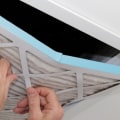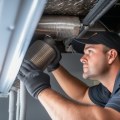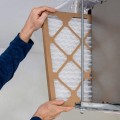When it comes to air filtration, the Minimum Efficiency Report Value (MERV) is the standard for measuring the efficiency of an air filter. A MERV 8 filter is considered superior filtration compared to air filters with a lower MERV rating, and is usually good enough to do the work of an average household. But is that enough leakage?In many cases, a MERV 8 air filter is more than adequate. It can stop mold spores, pollen and most cleaning agents.
However, if you are concerned about outdoor air pollution, family members with respiratory problems, or pets in the house, then choosing a higher MERV rating might be a good idea. A MERV 8 filter captures less than 20% of particles smaller than 0.3 microns. If you or someone else in your household smokes, you need more filtration than what a MERV 8 provides. The higher the filter rating, the smaller the particles it will capture and the higher the percentage of particles captured.
Low-efficiency filters are typically found within MERV 1-4 and high-efficiency filters are Merv 13 and later. The MERV scale is not linear; the difference between a MERV 6 and a MERV 8 is almost double in the percentage of particles captured. Please note that as the MERV rating increases, the filter becomes more restrictive and it will take more pressure and energy to push air through it. The pandemic has highlighted respiratory health and indoor air quality. More than ever, you need cleaner indoor air. Each air filter has its advantages and disadvantages, but both Merv 8 air filters and Merv 11 air filters are suitable for residential use.
If your home's HVAC system isn't capable of handling MERV 13, opt for a filter with the next highest possible rating. For example, if an air filter can capture at least 20% of E1, 65% of E2, and 85% of E3 particulates, it will earn a Merv 11 rating. Although the American Society of Heating, Refrigeration and Air Conditioning Engineers (ASHRAE) suggests MERV 13, it may not be the most efficient option for some residential HVAC systems. However, to truly ensure clean and healthy air, MERV 13-16 filters are considered ideal for indoor spaces. If you have difficulty breathing because of a health problem, you are far from alone. Millions of Americans suffer from respiratory diseases and related health problems.
Problems such as asthma, COPD and allergies are affected by indoor air quality. The solution to improve indoor air pollution starts with filtration. So is a MERV 8 rating enough? Yes. It is good enough for air filtration in average residential homes. However, it is important to note that individual circumstances may require a filter with a higher MERV rating. The choice of the word “sinking” was intentional.
It should be clear that you should not try to get down into a rocky MERV filter. Consider this answer an unequivocal “yes”.In conclusion, while MERV 8 is good enough for most households, it's not enough if you have smokers or pets in your home or if you suffer from respiratory problems. The best way to ensure clean and healthy indoor air is to choose an air filter with the highest possible MERV rating for your specific HVAC system.






